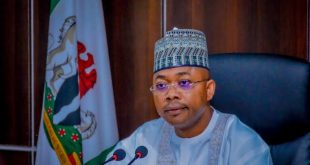In the midst of a global push to abolish the death penalty, the Deputy Speaker of the House of Representatives, Benjamin Kalu, has stated that the decision to abolish or retain the death penalty should ultimately be made by Nigerians themselves.
Kalu made this statement during a visit by a delegation from The Death Penalty Project, led by officials from the British High Commission.
He emphasised the need for extensive debate, engagement, and collaboration among various stakeholders, recognising the differing opinions on the issue.
The Deputy Speaker highlighted that over 130 countries globally have either abolished the death penalty in law or practice.
He noted that Nigerian laws have evolved over time to reflect the changing sentiments of society, with the current legal framework permitting capital punishment for serious crimes such as murder, armed robbery, and treason.
Referring to the alarming statistics of death row inmates in Nigeria and around the world, Kalu stressed the urgent need for reform in the country’s criminal justice system.
He revealed that the Constitution Review Committee, which he chairs, has thoroughly considered the implications of the death penalty, taking into account both its moral and ethical aspects, as well as its practical impact on society.
While no formal bill has been presented to the House yet, Kalu hinted that a bill might soon be tabled for discussion.
This would allow Nigerians to have their say on the matter, ensuring that the decision reflects the will of the people.
Kalu also pointed out that the growing trend toward abolition of the death penalty internationally reflects a shift towards justice systems focused on rehabilitation and restorative practices rather than purely punitive measures.
He emphasised that discussions on the matter aim to create a justice system that is fair, effective, and upholds human rights without undermining the seriousness of capital offences.
“We owe it to our citizens to ensure that their rights are protected and that our laws meet the highest standards of justice,” Kalu added.
Saul LeurFeund, co-founder and co-executive director of The Death Penalty Project, who led the delegation, expressed their desire to work with Nigeria’s parliament on the potential abolition of the death penalty.
He highlighted recent progress in other countries, such as Zimbabwe, which abolished the death penalty on New Year’s Eve, and noted that the project aims to bring together stakeholders to discuss the possibility of constitutional amendments and provide technical support in the process.
Their visit, he said, was aimed at fostering important conversations around the death penalty in Nigeria and exploring potential solutions for reform.
 National Telescope national telescope newspaper
National Telescope national telescope newspaper



